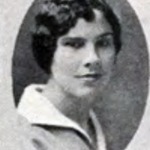Interviewer: Molly K. McFerran
Interview Date: May 27, 1991
Location: Dimick residence, Corvallis, Oregon
Duration: 0:39:46
In this interview, Mary Dimick begins by explaining her daughter’s friendship with Ulysses Grant McAlexander, a celebrated OAC figure and war hero from World War I. She then describes her childhood in Sellwood, Oregon, and her memories of the people she encountered from the Siletz Indian Reservation. She also discusses her feelings about the reservation system.
Next, Dimick describes how people felt about nature and the environment when she was a child, her experiences camping in Oregon, and the culture of disposability that she feels has developed since her youth. She explains why she never learned to drive and how she gets around without a car. From there, Dimick describes her use of pesticides in her garden and shares her perspective on the conflicts in Oregon between environmentalists and timber interests. She recalls her son’s experience of working in a lumber mill and the dangers that he and other workers faced from metal spikes placed in trees by environmentalists.
As the interview nears its conclusion, Dimick describes how the Depression affected Corvallis and the decisions Oregon State College was forced to make in order to retain its faculty. Finally, she describes her health and what she does to live well as a nonagenarian.
Dublin Core
Title
Description
Next, Dimick describes how people felt about nature and the environment when she was a child, her experiences camping in Oregon, and the culture of disposability that she feels has developed since her youth. She explains why she never learned to drive and how she gets around without a car. From there, Dimick describes her use of pesticides in her garden and shares her perspective on the conflicts in Oregon between environmentalists and timber interests. She recalls her son’s experience of working in a lumber mill and the dangers that he and other workers faced from metal spikes placed in trees by environmentalists.
As the interview nears its conclusion, Dimick describes how the Depression affected Corvallis and the decisions Oregon State College was forced to make in order to retain its faculty. Finally, she describes her health and what she does to live well as a nonagenarian.

